Tangier’s Hidden Gems: A Crossroads of Cultures
Tangier, a city located at the northern tip of Moroccois a captivating fusion of North African, Spanish, Portuguese, and French influences, making it a true crossroads of cultures with a rich Jewish heritage. Tangier sits at the western entrance to the Strait of Gibraltar where the Mediterranean meets the Atlantic Ocean off Cape Spartel. The city’s unique position has shaped its history, architecture, and cultural tapestry, attracting visitors from around the world. Tangier’s location has played a pivotal role in shaping its identity.
Jewish Heritage in Tangier: A Historical Overview
As the capital of the Tétouan Region it has a rich Jewish history due to the historical presence of many civilizations and cultures that conquered this area from the 5th century BC. It has been a melting pot of diverse cultural influences. This fusion is evident in the city’s architecture, cuisine, and traditions, creating a rich tapestry of experiences for visitors and in particular for those seeking to explore Morocco’s Jewish Heritage sites and Sephardic traditions.
Exploring Tangier’s Jewish Heritage Sites
Tangier has a rich tapestry of Jewish Heritage Sites. Referred to as the “White Bride of the North,” Tangier is home to a rich tapestry of Jewish Heritage Sites that offer a glimpse into a historically vibrant Jewish community that once thrived there. On a Private, Guided Tangier Jewish Tour, our expert guides will unveil the hidden stories of the Jews dating back to the Temple of Solomon along with showcasing Tangiers synagogues, cemeteries and a new Jewish Museum .
The first Jews migrated to Tangier (once known as Tanja or Tingus) after the destruction of the First Temple in Jerusalem and settled among the Berbers. Jews of Tangier were later met by a second wave of migration from the Jews living in the Iberian Peninsula during the 1492 Alhambra Decree. During this time the Jews were expelled from Spain and Portugal. This second wave of immigration changed Moroccan jewry, as they largely adopted the Andalusian Sephardic liturgy, creating a population of Moroccan Jews that gained a primarily Sephardic identity.
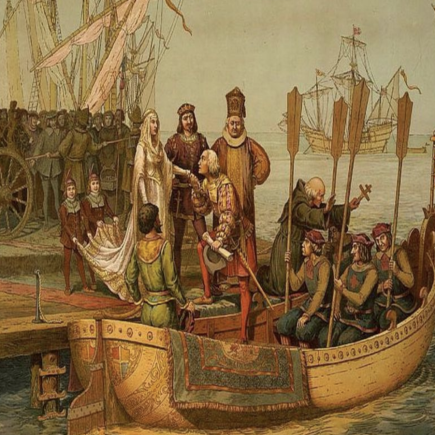
August 1 on the Gregorian calendar, which aligns with the 9th day of Av 5777 on the Hebrew calendar, holds profound significance in Jewish and world history. It was on this day in 1492 that the Alhambra Decree was issued by the Spanish Monarchs, resulting in the expulsion of the Jewish population from Spain. This edict not only altered the course of Jewish history but also had far-reaching implications on a global scale.
The issue of the Alhambra Decree in 1492 marked a pivotal and heart-wrenching juncture for the Jewish community. This cruel and unjust decree forced thousands of Jews to leave their homes, abandon their possessions, and seek refuge in unfamiliar lands. The expulsion led to immense suffering, dispersal, and the loss of cultural and religious heritage. The expulsion of the Jews from Spain also reverberated throughout the world. It resulted in the dissemination of Jewish communities to various parts of Europe, North Africa, the Middle East, and beyond. This dispersion gave rise to new cultural exchanges, influenced artistic and intellectual movements, and contributed to the rich tapestry of global history and civilization.
The Moors and the Jews intermixed in Tangier, living peacefully side by side. In 1856, Tangier had become the largest port in Morocco. Alongside, the Jewish community of Tangier flourished and established schools, hospitals, charitable works and businesses. By 1925 Jews were assigned three out of the twenty-six seats on the Legislative Assembly offering them significant political power. Post World War II the Jews of Tangier enjoyed a prosperous and cosmopolitan lives as they were not affected by the war and offered protection by Mohammed V who referred to them as “Moroccans and not only Jews.” At its peak in the 1940s, there were 22,000 Jews in Tangier and Morocco’s Jews population exceeded 350,000. Today, there is a vibrant community in Morocco which counts approximately 2000 – 2500 Jews.
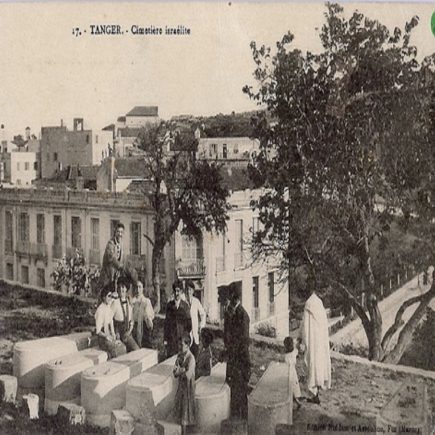
Delving into Tangier’s Jewish Quarter: A Living Legacy
Tangier did not have a formal Jewish Mellah similar to those in Casablanca, Fes, Marrakech and Essaouira, it did have a Jewish Quarter. Embarking on a journey through Tangier’s Hidden Gems, the Jewish quarter and heritage sites, is akin to entering a time capsule that preserves the essence of a Bygone era. As you navigate the labyrinthine streets, you are enveloped by the enduring spirit of a community that has left an indelible mark on the city’s cultural fabric. The Jewish quarter, with its ornate synagogues, quaint alleyways, and bustling marketplaces, Beckons visitors to immerse themselves in a captivating narrative of resilience and cultural tenacity.
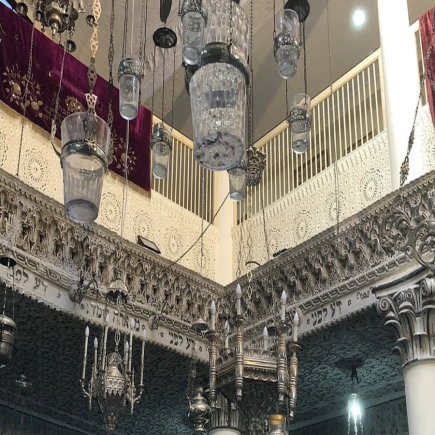
The Moshe Nahon Synagogue: Architectural Marvel
The Moshe Nahon Synagogue is a Testament to faith and resilience. At the heart of Tangier’s Jewish heritage lies the Moshe Nahon Synagogue, an intimate, architectural marvel that stands as a testament to the enduring faith and resilience of the community. The soaring ceilings, glass lamps and motifs adorning the synagogue’s interior transport visitors to a realm of timeless beauty and profound spiritual significance. As you stand within the hallowed halls of this sacred edifice, you are enveloped by a sense of reverence and awe, attesting to the enduring legacy of Tangier’s Jewish heritage.
Behind a non-descript door, located on Rue Synagogue in Tangier is the Moshe Nahon Synagogue. This last remaining operating synagogue in Tangier is monumental and lavish, ranking among one of the most beautiful synagogues in Morocco. Built in the 1870’s the Nahon Synagogue remained as a working place for Jewish prayer until it fell into despair in the lat 20th Century. Then in 1994 it was renovated revealing intricately covered carvings that are illuminated by magical hanging synagogue lamps and Jewish artifacts. At one time there were over 20 synagogues in Tangier. On Rue des Synagogues, there are many closed synagogues. One of them, Temple Benatar, has been restored and is superbly decorated.
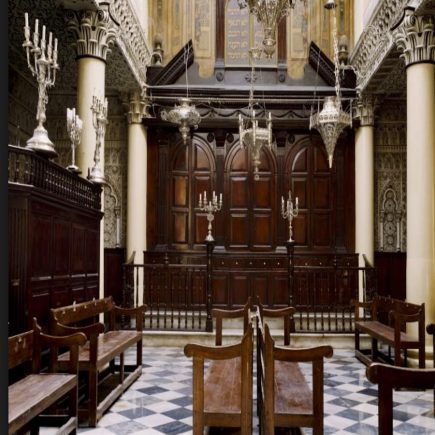
Chaar Rafael Synagogue: Preserving Tangier’s Legacy
The Char Rafael Synagogue of Tangier is one of the last surviving synagogues. Chaar Rafael is one of the last surviving synagogues and remnants of Jewish Heritage in Tangier. Located on 27 Boulevard Pasteur in Tangier this Jewish owned villa was built in 1919, and it was converted to a synagogue in 1954 when the owner, Raphaël Bendriahm died. Located in the center of the European city, Chaar Rafael is nearby the ocean cliffs where the stone outlines of the tombs of the Phoenicians, who came with Jews to Tangier almost three thousand years ago.
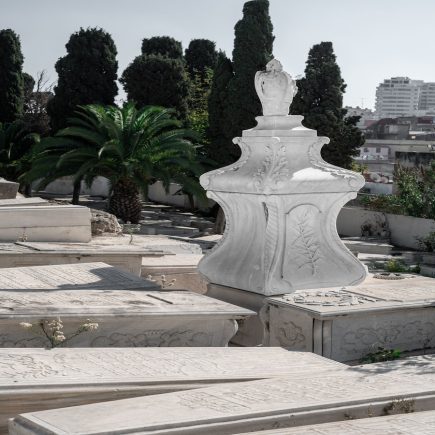
Beit Hahayim – Tangier Jewish Cemetery:
The Jewish Cemetery in Tangier, referred to as the “old cemetery” has more then one-thousand graves, some of which date back to the 16th Century. There are many important individuals buried there. Owned by the Tangier municipality, the Jewish Cemetery is open to the public and has caretakers who oversee it. While the cemetery has somewhat fallen to ruins with a combination of erosion and water issues, the tombstones have been digitized to offer those interested the opportunity to search the remains there online. The tombstones are in Hebrew, Portuguese and French.
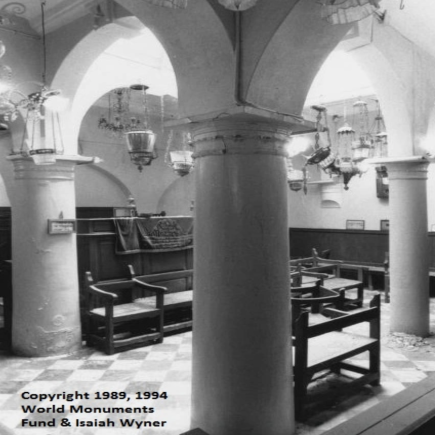
Built in the 19th Century, the synagogue is named after Abraham Toledo who was a prominent member of the Tangier Jewish community. Referred to a the “Great Synagogue” Known for its beautiful hand carved woodwork and ornamentation, this synagogue is one of the oldest yet no longer in use.
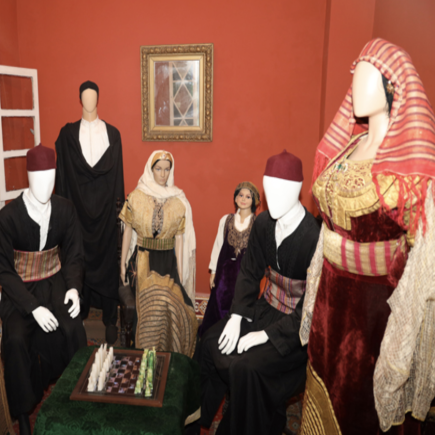
Beit Yehuda Jewish Museum: Preserving Cultural Heritage
The Beit Yehuda Tangier Jewish Museum (Assayag Synagogue) and its exclusive collection is dedicated to preserving the Jewish history of Tangier. Tea Jewish Museum is located inside the Assayag synagogue. The restoration was entrusted to the architect Malika Laâroussi and the exhibition of the museum to Mrs Isabelle Timsit. The museum project was part of the rehabilitation work of the city’s synagogue abandoned for over 60 years.The rehabilitation work required a budget of MAD 2 million ($192,361) financed by Morocco’s Ministry of Culture. A committee of the Jewish community also contributed financially to the realization of the works of scenography of the museum space to preserve and promote the cultural heritage of Judaism. King Mohammed VI has been emphasizing the importance of Jewish identity as an integral part of Morocco’s cultural diversity. The King dedicated a long passage in his King and People’s Revolution speech highlighting the importance of the diaspora, including the Jewish community.
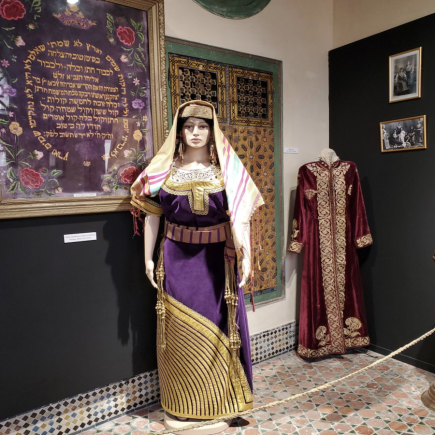
American Legation Museum: Tangier’s Cultural Exchange
The American Legation Museum is located in a five story villa in Tangier and is the oldest American consulate in continuous use. Since 1829/1923 when Tangier was established as an International city, there were many Moroccan Jews who served as American proteges, placing them beyond the law of the Sultan. A private collection of Berber/Jewish history and bridal gowns/dresses. The American Legation in Tangier is the only US Historic Monument located outside American soil. It hosts the Tangier American Legation Institute for Moroccan Studies (TALIM). TALIM includes, among others, a private museum, a research library accessible by appointment only, and a community Arabic Literacy Program.
To Book a Tangier Jewish Heritage Tour, contact the Travel Exploration Morocco


0 Comment